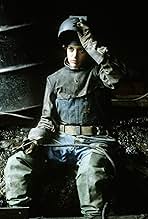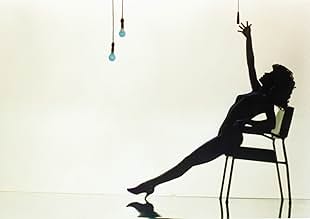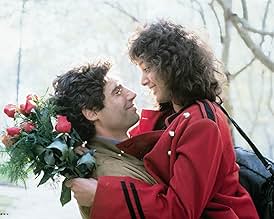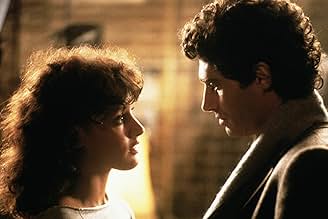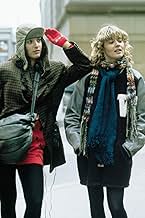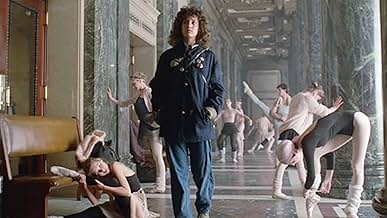Flashdance
- 1983
- Tous publics
- 1h 35m
An 18-year-old female amateur dancer who performs nightly at a dancing bar, and works as a welder during the day, dreams of joining the Pittsburgh ballet school.An 18-year-old female amateur dancer who performs nightly at a dancing bar, and works as a welder during the day, dreams of joining the Pittsburgh ballet school.An 18-year-old female amateur dancer who performs nightly at a dancing bar, and works as a welder during the day, dreams of joining the Pittsburgh ballet school.
- Won 1 Oscar
- 14 wins & 17 nominations total
Philip Bruns
- Frank Szabo
- (as Phil Bruns)
Featured reviews
There are already many comments on this film in the IMDb database, and I had no intention of writing another until to my surprise I noticed that it was frequently being replayed on several different local TV channels. Flashdance is a very outdated movie that has never appealed to most film critics, so I felt this was sufficiently unusual to justify an attempted explanation.
Since the DVD of Flashdance was released, it has appeared for hire in many small local convenience stores and service stations that only maintain a very small rack of films for hire Clearly although it is now very much of a period movie, it continues to retain an enormous appeal for many of those who have seen it before. Personally I have watched our tape of Flashdance more often than most of the other tapes we have at home. This is not because it would be my first choice, but because it is a film that my wife loves to watch again and again; whilst I find I can view it repeatedly more readily than many of her other favorite tapes, so when we are discussing what to view and have rejected a number of other possibilities we tend to turn back to Flashdance. This reinforces the comments already made in your database about Flashdance being a "feel good" movie for which most people seem able to ignore the faults and just enjoy the music, the dancing and the romance. (It also features "Grunt", a very appealing dog, who remains one of the reasons why my wife is always ready to rewatch this film.) As a film Flashdance is therefore something of a paradox. Originally the final product was not very highly regarded by the studio and only received a limited release. This was severely panned by most of the critics, and not surprisingly the film initially received very little support from the public. The reviews and the low attendance led to plans to withdraw it from circulation early, but before these were implemented the audiences started to grow and continued to increase until cinemas showing the film were mostly packed out. Clearly those few who saw the film at an early showing started telling their friends to ignore the critics and see it. This escalated exponentially until the film finished up as a major hit. In commenting on this film it would be equally invalid to ignore the very real concerns of the critics or the equally real appeal it had, and still seems to have, for most of the public.
The story is trite - a female welder in a steelworks dreams of being a ballet dancer and practices her dancing in one of the local bars at night. Here she meets and starts to fall in love with her fairly young divorced boss. With his support she is able obtain an audition with a major dance company who are essentially only interested in her dance training, and lose any interest they may have had when she says she has never attended a dance school. However she proceeds to audition for the very bored selection committee and gives an electrifying free dance performance that in true fairy story tradition brings the committee to its feet. Some critics have complained that doubles replaced the star Jennifer Beals for this sequence, but this is surely not important - the real question is how effectively the film plays, and this sequence has rightly been very widely admired. About the time the film was released, modern dance companies were being formed alongside traditional ballet companies in many major cities in North America and this sequence certainly added to the appeal of the film at the time, but it is decidedly not the only reason for watching it.
I could spend pages criticizing the screenplay in several different respects, but other comments in your database have already done this, and these criticisms are ultimately not damming. The important thing is that the film maintains an ongoing flow which sweeps most viewers along and earns it a place as one of the finer musical comedies to have been released in the past quarter century. The object of a film is to entertain the public and in ranking Flashdance I feel I must base my rating on its undeniable success in doing just this. So 7 out of 10.
Since the DVD of Flashdance was released, it has appeared for hire in many small local convenience stores and service stations that only maintain a very small rack of films for hire Clearly although it is now very much of a period movie, it continues to retain an enormous appeal for many of those who have seen it before. Personally I have watched our tape of Flashdance more often than most of the other tapes we have at home. This is not because it would be my first choice, but because it is a film that my wife loves to watch again and again; whilst I find I can view it repeatedly more readily than many of her other favorite tapes, so when we are discussing what to view and have rejected a number of other possibilities we tend to turn back to Flashdance. This reinforces the comments already made in your database about Flashdance being a "feel good" movie for which most people seem able to ignore the faults and just enjoy the music, the dancing and the romance. (It also features "Grunt", a very appealing dog, who remains one of the reasons why my wife is always ready to rewatch this film.) As a film Flashdance is therefore something of a paradox. Originally the final product was not very highly regarded by the studio and only received a limited release. This was severely panned by most of the critics, and not surprisingly the film initially received very little support from the public. The reviews and the low attendance led to plans to withdraw it from circulation early, but before these were implemented the audiences started to grow and continued to increase until cinemas showing the film were mostly packed out. Clearly those few who saw the film at an early showing started telling their friends to ignore the critics and see it. This escalated exponentially until the film finished up as a major hit. In commenting on this film it would be equally invalid to ignore the very real concerns of the critics or the equally real appeal it had, and still seems to have, for most of the public.
The story is trite - a female welder in a steelworks dreams of being a ballet dancer and practices her dancing in one of the local bars at night. Here she meets and starts to fall in love with her fairly young divorced boss. With his support she is able obtain an audition with a major dance company who are essentially only interested in her dance training, and lose any interest they may have had when she says she has never attended a dance school. However she proceeds to audition for the very bored selection committee and gives an electrifying free dance performance that in true fairy story tradition brings the committee to its feet. Some critics have complained that doubles replaced the star Jennifer Beals for this sequence, but this is surely not important - the real question is how effectively the film plays, and this sequence has rightly been very widely admired. About the time the film was released, modern dance companies were being formed alongside traditional ballet companies in many major cities in North America and this sequence certainly added to the appeal of the film at the time, but it is decidedly not the only reason for watching it.
I could spend pages criticizing the screenplay in several different respects, but other comments in your database have already done this, and these criticisms are ultimately not damming. The important thing is that the film maintains an ongoing flow which sweeps most viewers along and earns it a place as one of the finer musical comedies to have been released in the past quarter century. The object of a film is to entertain the public and in ranking Flashdance I feel I must base my rating on its undeniable success in doing just this. So 7 out of 10.
In recent years there have been a number of British films based on the theme of working-class people who find fulfilment through their cultural activities; examples being Educating Rita (the first and most distinguished), Brassed Off, The Full Monty and Billy Elliott. Such films are frequently described as `quintessentially British' or `something that we can do and Hollywood can't', whereas the truth is that twenty years ago Hollywood was indeed making very similar films, mostly centred upon dancing, such as Saturday Night Fever, Dirty Dancing or Flashdance. Whereas these American films may not have had the covert (or, in the case of Brassed Off, highly overt) political message of their British counterparts, they nevertheless concentrated on differences in social class far more than Hollywood movies usually do.
The heroine of Flashdance, Alex, is a young woman who works as a welder and whose main joy in life is dancing. She moonlights as a dancer in a local nightclub, but her great ambition in life is to become a ballet dancer. The film tells the story of how she achieves that ambition, as well as the story of her romance with a wealthy middle-class divorcee, set against frequent dance sequences as Alex and her ice-skating friend Jeanie go through their paces. The climax comes with a scene in which she auditions for a place at a prestigious ballet academy and treats the judging committee to a bravura display of breakdancing. (Would a ballet school really be prepared to offer a place to a candidate whose dance skills owe more to the disco than to Swan Lake and who seems completely ignorant of balletic idiom?)
The film has its weak points. Although the plot is not as non-existent as some reviewers have felt, it nevertheless tends to take second place to the showpiece dance numbers; at times, it felt as if I were watching an extended series of pop videos. Potentially interesting themes are ignored; for example, Alex is a practising Catholic, but this seems to be a plot device to enable scenes set in the confessional to be used as soliloquies in which she can air her emotional problems. No attempt is made to explore the possible conflict between the demands of her religion and her sexually provocative dancing or her love for a divorcee.
The acting is undistinguished; Jennifer Beals makes an attractive and personable heroine, but it is clear why, despite the success of this film, she did not go on to become a major star. Her acting is too weak to enable her to carry a film; certainly I felt that she would be out of her depth in one that depends more upon plot and less upon song and dance. The other characters are little more than ciphers, with the exception of Hanna, the old lady who acts as Alex's mentor. I could certainly have done without the tasteless ethnic jokes told by Alex's comedian friend.
Yet, despite its faults, I enjoyed this film. Its redeeming feature is the zest and energy of its dance sequences, set to some well-chosen music such as Laura Branigan's Gloria or Irene Cara's title song. It may not be deep or significant, but it is an enjoyable, well-made piece of popular entertainment. 6/10.
The heroine of Flashdance, Alex, is a young woman who works as a welder and whose main joy in life is dancing. She moonlights as a dancer in a local nightclub, but her great ambition in life is to become a ballet dancer. The film tells the story of how she achieves that ambition, as well as the story of her romance with a wealthy middle-class divorcee, set against frequent dance sequences as Alex and her ice-skating friend Jeanie go through their paces. The climax comes with a scene in which she auditions for a place at a prestigious ballet academy and treats the judging committee to a bravura display of breakdancing. (Would a ballet school really be prepared to offer a place to a candidate whose dance skills owe more to the disco than to Swan Lake and who seems completely ignorant of balletic idiom?)
The film has its weak points. Although the plot is not as non-existent as some reviewers have felt, it nevertheless tends to take second place to the showpiece dance numbers; at times, it felt as if I were watching an extended series of pop videos. Potentially interesting themes are ignored; for example, Alex is a practising Catholic, but this seems to be a plot device to enable scenes set in the confessional to be used as soliloquies in which she can air her emotional problems. No attempt is made to explore the possible conflict between the demands of her religion and her sexually provocative dancing or her love for a divorcee.
The acting is undistinguished; Jennifer Beals makes an attractive and personable heroine, but it is clear why, despite the success of this film, she did not go on to become a major star. Her acting is too weak to enable her to carry a film; certainly I felt that she would be out of her depth in one that depends more upon plot and less upon song and dance. The other characters are little more than ciphers, with the exception of Hanna, the old lady who acts as Alex's mentor. I could certainly have done without the tasteless ethnic jokes told by Alex's comedian friend.
Yet, despite its faults, I enjoyed this film. Its redeeming feature is the zest and energy of its dance sequences, set to some well-chosen music such as Laura Branigan's Gloria or Irene Cara's title song. It may not be deep or significant, but it is an enjoyable, well-made piece of popular entertainment. 6/10.
Flashdance is one of my Top Ten Films. I don't care that it has no twisting plot. I don't care that Jennifer Beals used a body double. I REALLY don't care that it's a chick flick. I love this movie!! Some people, after seeing Flashdance, choose to see a movie about exotic dancing. For one reason or another, I see a movie about chasing dreams, taking chances, and maximizing life.
Jennifer Beals' character Alex Owens's dream of attending a formal dance school and becoming a ballerina is the central theme of the film. Her friends Jeanie and Richie are aspiring figure skaters and stand-up comedians, respectively. However, Alex is the only dreamer receiving any encouragement. Her senior citizen friend Hannah, a former ballerina herself, gives Alex practical advice and unconditional faith. Jeanie's father openly criticizes Jeanie's dream as well as her beau, Richie. Richie, a cook at Mawby's Bar, is put down by his boss for wanting to go to Hollywood and being a comedian; "You're too short. They don't let short people into Hollywood."
The sub-plots facilitate Alex's dream to create a captivating story. To support herself (and possibly, to keep life interesting), Alex holds 2 jobs: a welder by day and a dancer at aforementioned Mawby's Bar during the night. Her welding boss Nick takes a liking to her and pursues her. Alex resists his charms but gives in eventually. Johnny C., the sleazy strip bar owner continually tries to lure Alex into dancing for him. As mentioned before, Alex's friends Jeanie and Richie have dreams of their own, and we see where their dreams take them.
The factor that made Flashdance a hit was the music, of course. "What a Feeling" took away an Oscar for Best Song. "I'll Be Here Where the Heart Is", sung by Kim Carnes ("Bette Davis Eyes") fits Alex's personal-crisis scene perfectly.
The first time I watched Flashdance was 4 years ago; I bought the video knowing I'd like it. After 20+ viewings, I still love it. Flashdance is for anyone who has a dream but not the courage to pursue it.
Jennifer Beals' character Alex Owens's dream of attending a formal dance school and becoming a ballerina is the central theme of the film. Her friends Jeanie and Richie are aspiring figure skaters and stand-up comedians, respectively. However, Alex is the only dreamer receiving any encouragement. Her senior citizen friend Hannah, a former ballerina herself, gives Alex practical advice and unconditional faith. Jeanie's father openly criticizes Jeanie's dream as well as her beau, Richie. Richie, a cook at Mawby's Bar, is put down by his boss for wanting to go to Hollywood and being a comedian; "You're too short. They don't let short people into Hollywood."
The sub-plots facilitate Alex's dream to create a captivating story. To support herself (and possibly, to keep life interesting), Alex holds 2 jobs: a welder by day and a dancer at aforementioned Mawby's Bar during the night. Her welding boss Nick takes a liking to her and pursues her. Alex resists his charms but gives in eventually. Johnny C., the sleazy strip bar owner continually tries to lure Alex into dancing for him. As mentioned before, Alex's friends Jeanie and Richie have dreams of their own, and we see where their dreams take them.
The factor that made Flashdance a hit was the music, of course. "What a Feeling" took away an Oscar for Best Song. "I'll Be Here Where the Heart Is", sung by Kim Carnes ("Bette Davis Eyes") fits Alex's personal-crisis scene perfectly.
The first time I watched Flashdance was 4 years ago; I bought the video knowing I'd like it. After 20+ viewings, I still love it. Flashdance is for anyone who has a dream but not the courage to pursue it.
Okay - the dancing is done by someone else, the script has a bunch of flaws (dialogue being almost the worst), and the basic premise is absurd - an 18-yo dreaming of starting a career in ballet? (In ballet, you're just about approaching the peak of your career at 18.)
However, the movie has some heart-grabbing moments, the score is wonderful, the girls are pretty, and the moral of the story (keep on trying until you win) is as true as it ever was. This is probably the worst movie you'll ever have a wonderful time watching.
As a past professional dancer, I probably watch this movie about once a year. It's an essential part of any dancer's library, regardless of its flaws.
However, the movie has some heart-grabbing moments, the score is wonderful, the girls are pretty, and the moral of the story (keep on trying until you win) is as true as it ever was. This is probably the worst movie you'll ever have a wonderful time watching.
As a past professional dancer, I probably watch this movie about once a year. It's an essential part of any dancer's library, regardless of its flaws.
Sure, Flashdance will never make the AFI's Top 100, but it has an infectious charm. Jennifer Beals is really only so-so in the leading role, and her leading man Michael Nouri is no better off, but it doesn't matter. What does matter here is the great music! Really, the whole film is played like a 90-minute ad for MTV! Laugh at the dopey plot and listen to the great tunes. Great film to earmark the 80s.
Did you know
- TriviaJennifer Beals' trend-setting collarless sweatshirt came about by accident. The sweatshirt, which Beals brought from home, had shrunk in the wash and she had to cut the collar off in order to get it over her head. When director Adrian Lyne and costume designer Michael Kaplan saw it at the wardrobe fitting, they both loved it and Kaplan improved the overall look of the sweatshirt for the shoot.
- GoofsIn the climactic dance, Alex is played by several noticeably different people.
- ConnectionsFeatured in Irene Cara: Flashdance... What a Feeling (1983)
- SoundtracksImagination
Performed by Laura Branigan
Courtesy of Atlantic Records
Music by Michael Boddicker, Jerry Hey and Phil Ramone
Lyrics by Michael Sembello
Produced by Phil Ramone
- How long is Flashdance?Powered by Alexa
Details
- Release date
- Country of origin
- Language
- Also known as
- Electrodanza
- Filming locations
- Production companies
- See more company credits at IMDbPro
Box office
- Budget
- $7,500,000 (estimated)
- Gross US & Canada
- $92,921,203
- Opening weekend US & Canada
- $4,076,124
- Apr 17, 1983
- Gross worldwide
- $92,921,203
- Runtime1 hour 35 minutes
- Color
- Sound mix
- Aspect ratio
- 1.85 : 1
Contribute to this page
Suggest an edit or add missing content




